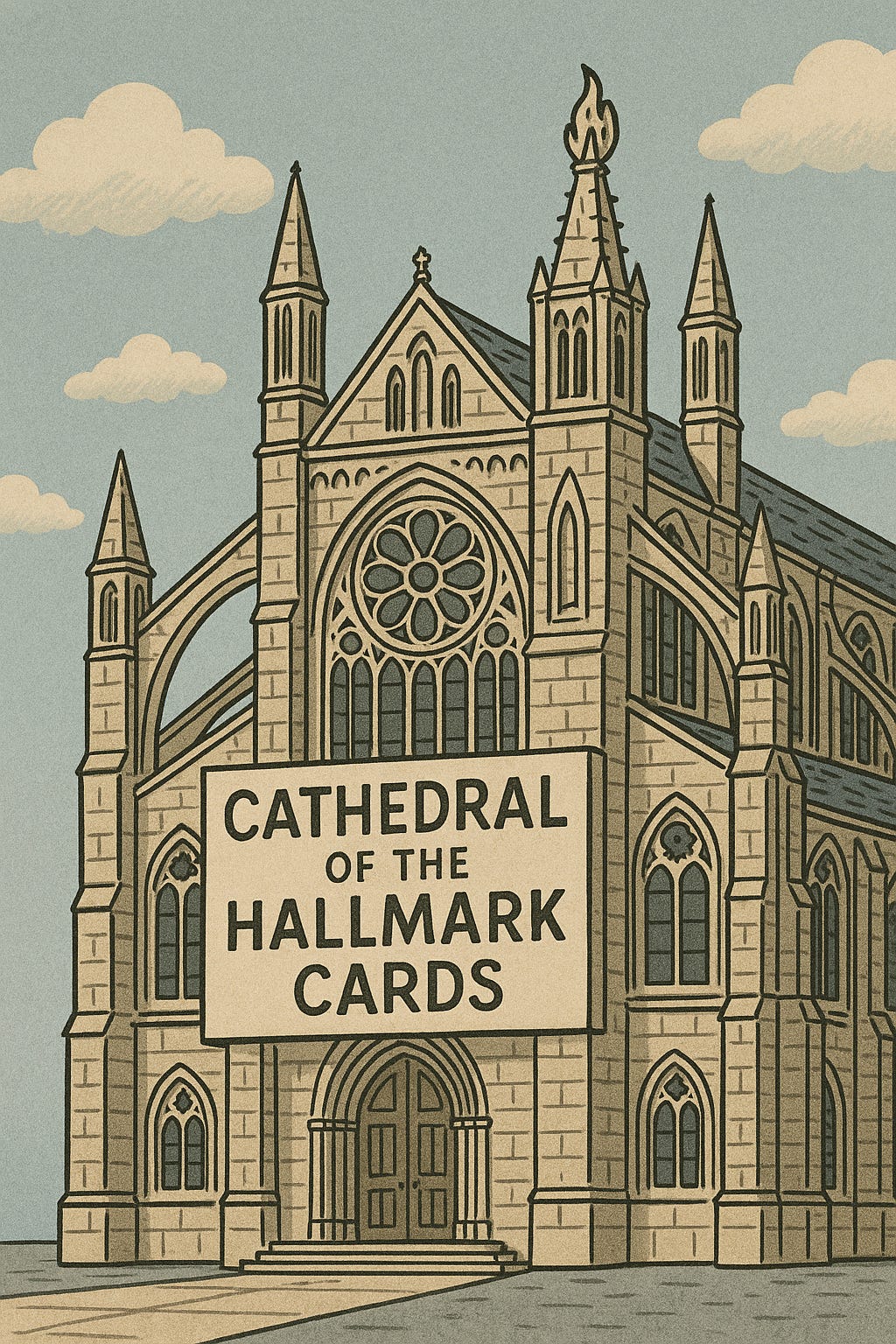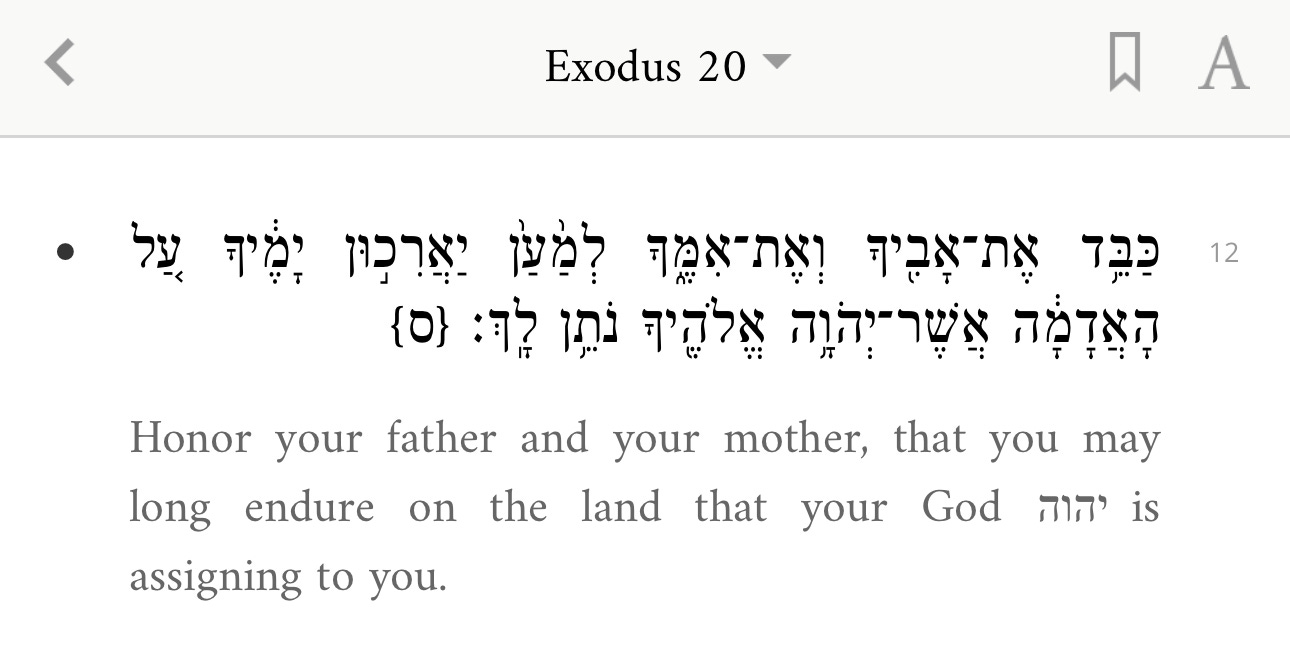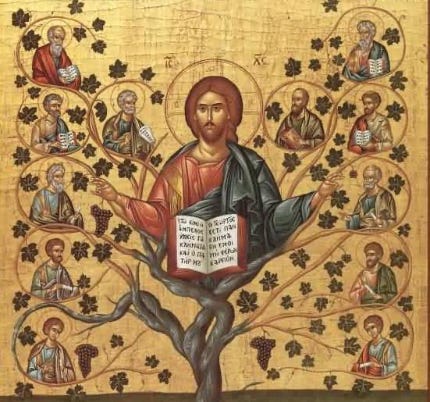The Church of Hallmark Card Morality
on the eve of Father’s Day I’m thinking about the hypocrisy of the hallmark days of holy obligation and how I find irritating and silly the whole culture of hypocrisy and fake morality
It’s Father’s Day tomorrow, you know that one day of the year when you decide to be nice to your dad, pretend you give any fcuks about him, in a performative act to convince everyone that you are a good person. Yeah, reader, I guess I think of Father’s Day as a Virtue Signal—like other Hallmark Card Days of Unholy Holy Obligation.
You buy some lame card and then buy some material object that your dad really doesn’t need and you’ve performed your care and concern for your dad until next year. Look at me, everyone, I did a thing for Father’s Day, aren’t I good?
If, like me, your dad is dead, then you’re tempted to thrust yourself into an unwelcome and irritating melancholy about the thing you’ve lost that others have. Or maybe your dad was a coward who left you as a kid. Or maybe your dad beat or raped or molested you. Or maybe your dad beat your mum whilst you watched in terror or tried to hide for fear he would come for you. In these cases we feel less than because life circumstances deny us the opportunity to glorify ourselves by performing the Hallmark Hypocrite Morality. Denied the dopamine hit of Hallmark Morality Virtue Signalling. Yes, reader, Hallmark Holy Days of Obligation are all about self glorification, and not much else.
Whingefest versus Fakery, reader — pick your poison. It’s a Hallmark Card Day of Holy Obligation and you will be assimilated, reader. You will be assimilated into the pretense. You will become a Stepford citizen of hypocritical morality. Submit now.
Father’s Day began quietly in 1910, by a young woman named Sonora Smart Dodd. Sonora liked the idea of Mother’s Day and wanted to honour her father and other fathers similarly. Civil War veteran William Jackson Smart raised Sonora and her five younger brothers by himself, after his wife died in childbirth when Sonora was 16. Sonora saw her father as “a real disciplinarian, but he was also kind and loving parent who kept us together and happy,” (Amante, Spokane Historical[dot]org).
It took several decades for Father’s Day to become a cultural staple—only in the late 1960s did the day receive national recognition and then in 1972 Richard Nixon proclaimed the third Sunday in June, the month of William Jackson Smart’s birthday, as permanent national day of observance to honour fathers. Sonora didn’t feel bothered by the growing commercialisation of Father’s Day, choosing to feel grateful that “at least I believe we've changed the sentiment of the country [regarding fathers], and associate fathers with something,” (Amante, Spokane Historical[dot]org).
Have we, with Father’s Day, changed society’s sentiment regarding fathers, though? Can we say that this day honours fathers, and symbolises their value and importance to the family unit and to humanity? Can we really say that, reader? I don’t know that we can do. As I said at the beginning of this essay, I see Father’s Day as self indulgent, a thing we do to mark a Hallmark Day of Holy Obligation, not a thing we do for dad.
Gift like a pro … need Father’s Day gift ideas … get the gift dad really wants this Father’s Day … the 32 best Father’s Day gifts … your dad deserves [insert retail product here]. Reader, it’s all so tiresome and silly. The focus is on me and I, what can me and I do to prove xyz to the world? Oh yeah, let’s throw dad in there for some added sentimental Virtue Signal points. All in service to the Church of Hallmark Card Morality.
Let’s examine the Biblical commandment to honour our parents. You can see the 5th commandment above. Readers may or may not be aware of the penalty established by the Torah for cursing our parents.
“The Torah decrees the death penalty for anyone who curses father or mother (Exodus 21,17) a penalty similar to that decreed for cursing G-d,” says Chizkuni, who continues, “the death penalty for cursing parents is completely natural, as when cursing one's parents one automatically curses G-d also, as He is one third partner in any human being, having supplied the soul.”
Says Rabbeinu Bahya, “in effect, what G'd says here is ‘just as I commanded you to treat Me with honor and respect, so I command you this day to treat your father and mother who are My partners in creating you with respect and honor. Just as one of the most important aspects of honoring G'd is to acknowledge Him as such, so one of the most important aspects of honoring one's parents is to acknowledge them as such.’”
So, reader, the Torah called on us to honour our parents in our daily lives. That means we live our lives with respecting and honouring our parents in the forefront, we practise daily this value of respecting and loving our parents. It goes well beyond a once-a-year shopping spree where we indulge our ego in spendthrift fashion, and love-bomb our parents with fakery we’ve saved up for a year.
Reader, religion has already instructed and encounter us to honour our father. The Torah commands it, on pain of death. The Orthodox Christian Church celebrates the Feast Day of the Forefathers, typically the Sunday before Christmas. We don’t need frying pans, power tools, sports gear, or any other material objects, to love and honour our dads and paternal figures. What if the culture of commerce cheapens the sentiment?
Let’s make Father’s Day every day, rather than an annual Hallmark Card Holy Day of Obligation. Hypocrisy leads us away from sincerity and respect. Choose love, choose it every day, choose it with your whole heart, be real and show up for stuff, make it about the little things and the difficult times and bearing witness in humility.









I appreciate you offering a historical context for Father’s Day. I never knew the origin story. Also, it is important to consider the religious context. Honoring our parents seems to be a lost art. I dislike Father’s Day for the same reason I dislike Mother’s Day and Valentine’s Day. These so-called celebrations are performative. The entire holiday centers around consumerism and gift-giving giving, as you mentioned. I don't feel anything inherently wrong with spending a day focused on a parent — perhaps sharing a special meal or having a picnic.
But, for me, the respect for one’s elders is generally lacking. Close to one-third of millennials have disowned their parents. There's a lack of connection, trust, and healthy bonding. It’s sad for the child and parents. The solution? Maybe time focused on strengthening family and extended family bonds.
My father was absent and met some of the criteria you described. While I deeply loved my father, the damage he did left a scar. I wish Father’s Day could be reframed as Protector’s Day or Supportive Male Figures Day. Over the years, there have been men who have been a source of support and guidance for me. It would be strange to send them a Father’s Day card. Lol. Some of them are my age! But, I could write them a letter and let them know how much their support has meant to me.